As the autumn leaves turn gold and crimson, pumpkin season approaches, which means it’s time to indulge in all things pumpkin spice. Pumpkin takes center stage in everything from lattes to desserts. But did you know that, aside from its delicious taste, pumpkin has a slew of wonderful health benefits?
Let’s look at the benefits of this versatile crop, as well as its nutritional worth and why pumpkin should be a staple in your fall meals.
More than just Jack-O-Lanterns
Before we get into the health advantages, let’s get acquainted with the various ways you can consume pumpkin. While pumpkins are commonly associated with carving jack-o-lanterns, there is more to this vegetable than meets the eye. Sugar pumpkin, a small, round species that may be found in your local vegetable area, is ideal for cooking. Canned pumpkin is a popular choice for those looking for convenience, and it’s great for pies, smoothies, and coffee drinks.
Here’s a brief nutritional comparison of canned versus raw pumpkin:
Pumpkin puree (per 1 cup):
– 83 calories
– 0.7 gram of fat
– 2.7 grams protein
– 19.8 grams of carbohydrates
– 7 grams fiber
– 8 gram sugar
1 cup raw pumpkin (cubed):
– 126 calories
– 0 g of fat
1 gram protein
7.5 grams carbohydrates
– 0.5 gram fiber
– 3 gram sugar
Aside from its delicious flavor, pumpkin carries a nutritional punch that can improve your health in a variety of ways. Let’s take a closer look at some of the amazing benefits of including pumpkin into your diet.
Fiber for digestive health
“Pumpkin provides fiber, and it’s a great way to meet your daily fiber recommendation, which is about 28 grams on a 2,000-calorie eating plan,” says Elizabeth Ward, MS, RDN, co-author of The Menopause Diet Plan. It’s a fantastic complement for digestive health, with roughly seven grams of fiber per cup in canned pumpkin and two grams in a cup of cooked whole pumpkin.
Fiber not only helps with regularity, but it also helps with cholesterol lowering and blood sugar stabilization. Pumpkin’s prebiotic fiber feeds good gut bacteria, promoting healthy digestion, immunity, and other benefits.
Skin-friendly vitamins
Pumpkin is beneficial to your skin as well as your taste senses. A (1,900 micrograms), C (10 micrograms), and E (2.5 micrograms) are all present in one cup of canned pumpkin. These vitamins work together to protect and improve the health of your skin.
– Vitamin A: Prevents UV damage to skin cells.
– Vitamin C: Aids in the formation of collagen and the hydration of the skin.
– Vitamin E: A strong antioxidant that protects against free radicals.
Support for eye health
Pumpkin’s high concentration of vitamins and antioxidants benefits your eyes as well as your skin. In the body, beta-carotene, which gives pumpkin its brilliant color, transforms into vitamin A, which is essential for keeping healthy vision. Pumpkin also includes lutein and zeaxanthin, both of which have been linked to a reduced risk of age-related macular degeneration and cataracts.
Immunity booster
According to Maggie Michalczyk, RDN of Once Upon a Pumpkin. “Pumpkin is high in antioxidants and packed with vitamins A and C, all of which help strengthen our immune system in different ways… Another reason to include it in our diets in the colder months.”A report published in Applied Food Research shows that integrating pumpkin into your diet will enhance immunity, assisting your body in fighting off infections.
Potassium for essential functions
Pumpkin contains a lot of potassium in addition to vitamins and antioxidants. A cup of pumpkin provides approximately 500 micrograms of potassium, which promotes normal blood pressure, muscular function, and heart health.
Heart-healthy combo
Pumpkin’s combination of potassium, vitamin C, fiber, and antioxidants is a recipe for heart health. Potassium lowers blood pressure, but fiber lowers cholesterol. Include pumpkin in your fall diet to improve your cardiovascular health.
Pumpkin seeds: Mini nutritional powerhouses
Remember to include pumpkin seeds, often known as pepitas. These little snacks are high in plant-based protein, fiber, healthy fats, and zinc. They’re great for your skin and immune system, and they’re a tasty complement to your fall menu.
As you prepare for the forthcoming pumpkin season, keep in mind that this humble vegetable provides considerably more than just colorful decorations. It’s a nutrient-dense superfood that can improve your health while also adding a seasonal flair to your dishes. So, enjoy the flavors of autumn with a generous helping of pumpkin, and appreciate the pleasant advantages it brings to the table.












